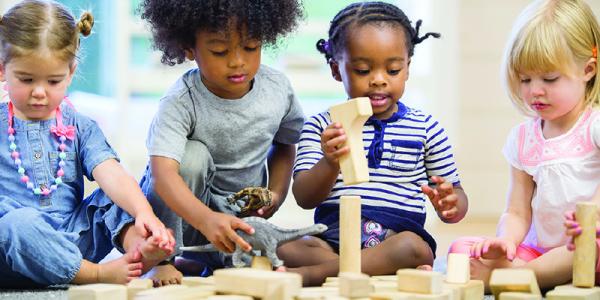Does Your Block Center Promote 21st Century Skills? A Checklist for Teachers

You are here
Use this checklist as you think about how your classroom's block center supports creativity, communication critical thinking and collaboration.
Creativity
____There is a designated area for block play that is open every day.
____Blocks are stored on open shelves with easy access.
____A variety of blocks are available.
____There are items from nature, recycled items, and art materials.
____Children can express their ideas in different ways.
Communication
____Toy vehicles, people, animals, and other props are available.
____Children can freely move from one center to another.
____Paper, pens, and pencils are available for blueprint designs.
____Children have opportunities to use their block creations for dramatic play and storytelling.
____Children can use digital tools to document, share, and discuss work.
Critical thinking
____I allow children’s block creations to “fail” and encourage children to solve problems creatively.
____I encourage children to be resilient when facing mistakes and frustrations.
____Children have time to share solutions and suggestions.
____I provide ways for children to save and document their building.
____Children can return to their structures often to improve and redesign them.
Collaboration
____There are enough blocks for groups of children to build with, but not so many that children can each have enough to build alone.
____I use the community as a resource for expanding block building and design.
____I identify tools that help problem solve and encourage children to do the same.
____Children plan, discuss, and even argue about block use, design, or purpose.
____Final block constructions are displayed or documented for sharing with others.
____I modify blocks and props for individual children’s needs.
Reproduced, with permission, from Karen Wise Lindeman and Elizabeth McKendry Anderson’s article, “Using Blocks to Develop 21st Century Skills in Preschool,” in Teaching Young Children, vol. 9, no. 3, p. 26.
Photo © iStock
Karen Wise Lindeman, PhD, is an assistant professor and the early childhood graduate program head in the Early Childhood and Reading Department at Edinboro University, in Edinboro, Pennsylvania. She has previously worked as a preschool director, kindergarten teacher, and early intervention provider. [email protected]
Elizabeth McKendry Anderson, EdD, is an assistant professor in the Graduate School of Education at Binghamton University, State University of New York. Elizabeth has worked on a variety of studies on integrating developmentally appropriate practices with new early learning standards, STEAM initiatives, and 21st century skills. [email protected]